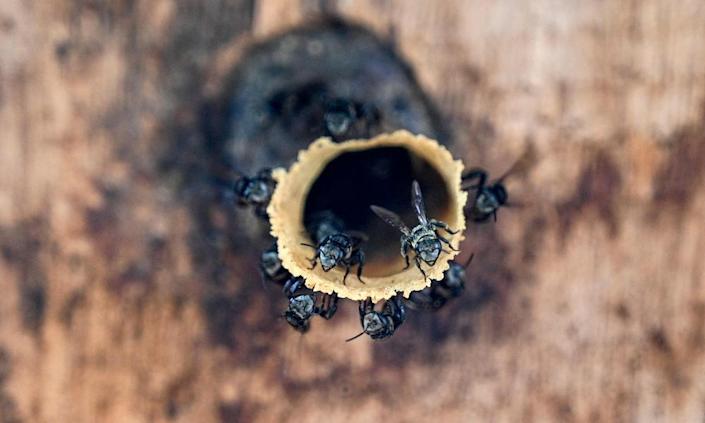The labyrinthine world of insects is in deep trouble. Scientists have uncovered startling declines in their populations , with the United Nations estimating that half a million species could be lost by the midpoint of this century.
In writing about this silent unfolding disaster for my new book, The Insect Crisis: The Fall of the Tiny Empires that Run the World, I explored how the loss of insects imperils our food security, potentially deprives us of new medicines and degrades the ecosystems we all rely upon to sustain life. Through habitat loss, pesticide use and climate change, we are creating a version of hell for our greatest allies on this planet.
But there is another reason to care about the insect crisis – their astonishing characteristics and abilities. Some seem otherworldly – such as the butterfly that has an eye on the tip of its penis.
“Each insect is like an alien life form with a detailed life history that often is so bizarre, you couldn’t create it as fiction if you wanted to,” as Michelle Trautwein, an entomologist at the California Academy of Sciences, told me.
Here are 10 of the most interesting things I found out about them.
Bees can do almost everything


Most of us are aware of the crucial pollination role that bees play in ensuring a steady supply of fresh fruit and vegetables. But researchers have uncovered an array of abilities in bees that may cause some surprise.
Honeybees understand the concept of zero, can add and subtract numbers and can even be trained to detect land mines more effectively than sniffer dogs. Their pollination services have become so valuable in the US that there is a growing criminal operation among “bee rustlers” to steal beehives in California’s farming heartland.
Some bumblebees, meanwhile, are able to fly at an altitude of 5,500 meters (18,000 feet) above sea level (a height just shy of Mount Kilimanjaro’s summit), can be taught to play soccer and remember good and bad experiences, suggesting they have a form of consciousness.
All of this is energy-intensive work. If a human male devoured a Mars bar, he’d burn the energy off in around an hour; a bumblebee of an equivalent size would use the same energy in just 30 seconds.
Beetles have the abilities of tiny superheroes
The world is awash with not rats, sheep or even humans, but beetles – around 350,000 species and counting. Some have adapted to humanity’s altering of the world, such as the weevils that feast on our grain.
Others are noteworthy in their own right. A horned dung beetle is so strong that if it were a human, it would be able to hold aloft six double-decker buses. Another type of beetle, a water beetle called Regimbartia attenuata, can even survive being eaten by a frog by swimming through the amphibian’s stomach and crawling out of its bottom.
There are people who will strongly defend mosquitoes


Mosquitoes are usually viewed as either an annoyance or a deadly menace. Indeed, there are fears that the threat of malaria and dengue will spread as we continue to heat up the world to mosquitoes’ liking.
But some entomologists have warm feelings towards mosquitoes, pointing to their pollination of certain flowers and their little-known environmental work, where they help cycle nutrients through soils and plants and provide food for animals higher up in the food chain, such as frogs and birds. Wiping out all mosquitoes would cause a cascade of detrimental impacts.
Cockroaches are hated – but impressive


The only insects that rival mosquitoes in our displeasure are cockroaches. There are thousands of species of cockroach found in forests but we tend to focus on the two – American and German – that have adapted themselves to our homes.
Objectively, these creatures are marvels. Slow-motion video footage reveals that the cockroach can crash into walls at high speed with no loss of momentum before scaling vertically. These great survivors can fit into cracks as thin as a small coin, bite with a force 50 times their body weight, and survive for two weeks after being beheaded.
Insects have shaped human history


Insects may not be celebrated like horses, tigers or dolphins, but they have played interesting cameo roles in our own history.
The common marsh mosquito was called the “founding mother” of the United States by one historian due to the malaria that ravaged the British army and helped force its surrender during the American Revolution. A century later, the emergence of modern beehive boxes unlocked the productivity of farmland and revolutionized agriculture.
What would you think the first animal in space was? A monkey? A dog or cat, perhaps? It was, in fact, a fruit fly that was propelled beyond the atmosphere in a US military rocket in 1947 to ascertain the potential impact of cosmic radiation on astronauts.
Moths are unfairly maligned
Moths are often slandered as powdery vandals that enjoy chomping their way through the clothes in our wardrobes. This is largely unfair – it’s the moth larvae, not adults, that feed on clothes, and even then only a couple out of the thousands of moth species do this.
Behold, instead, the Hercules moth of northern Australia. The world’s largest moth, the species has a wingspan as wide as a dinner plate but no mouth – it lives off the food reserves gobbled up while a bulky caterpillar – and two false eyes in its rear to confuse would-be predators.
We should think more highly of wasps


Wasps aren’t just the pillagers of bucolic picnics. They are also important pollinators of plants and predators of the pests that chew through our most valued flowers and crops.
Research has additionally found that paper wasps can grasp transitive inference, a logical arrangement whereby if A is greater than B, and B is greater than C, then A must be greater than C. These wasps can also recognize other individual wasps by looking at their faces.
The production of chocolate and ice cream depends on insects
Enjoy chocolate? Be thankful, then, for the tiny midge that pollinates the cacao plant. Want a world with ice cream in it? Then you’ll want the pollinators that ensure dairy-producing cows have enough alfalfa to eat.
Crickets may become the food of the future


Insects have been on the menu for societies across Asia, Africa and South America for generations but are still viewed with unease by many western diners. That may change as the ruinous environmental impact of meat eating prompts some to switch to insects such as crickets, which can be farmed in huge numbers with little resulting pollution.
Crickets can be seasoned with chili; ants can be dipped in lemon. These are high protein snacks that could alter our relationship and appreciation of insects in general.
People will show a fondness for insects in unusual ways
Winston Churchill’s butterfly collection helped ease his depression. Walter Rothschild, scion of the banking family, enjoyed dressing fleas in costumes. People across North America plant milkweed to aid monarch butterflies. Giant burrowing cockroaches are doted on as pets in Australia.
It’s lazy to dismiss insects as pests or irrelevances. Many of us see how precious they are to our world. That feeling will need to be multiplied, and harnessed, if we are to stem the greatest crisis they’ve ever faced.
The Insect Crisis: The Fall of the Tiny Empires that Run the World, is out now in the US




